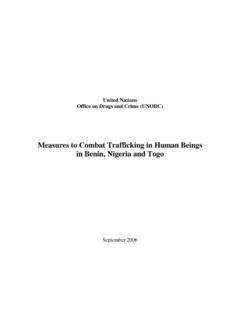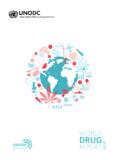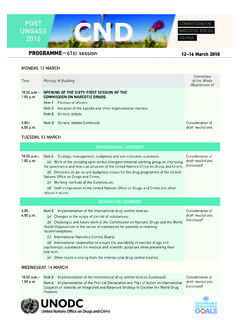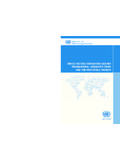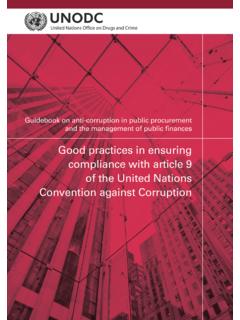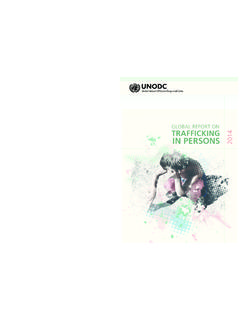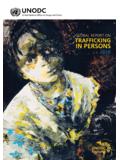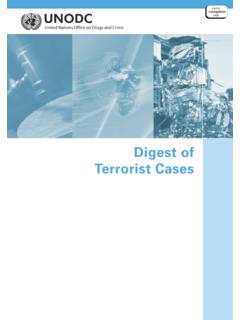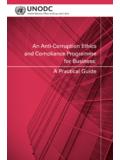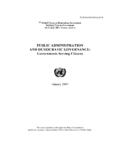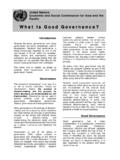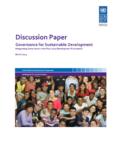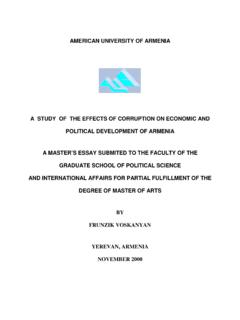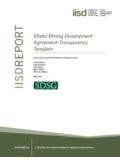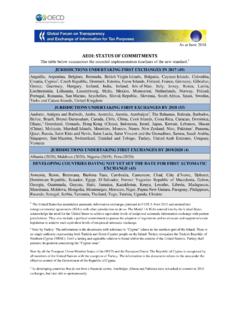Transcription of UNITED NATIONS CONVENTION AGAINST …
1 17/08/2004 12:33 Page 1. Vienna International Centre, PO Box 500, A 1400 Vienna, Austria Tel: +(43) (1) 26060-0, Fax: +(43) (1) 26060-5866, UNITED NATIONS CONVENTION . AGAINST corruption . Printed in Austria August 2004 copies UNITED NATIONS . UNITED NATIONS office ON DRUGS AND crime . Vienna UNITED NATIONS CONVENTION . AGAINST corruption . UNITED NATIONS . New York, 2004. Foreword corruption is an insidious plague that has a wide range of corrosive effects on societies. It undermines democracy and the rule of law, leads to violations of human rights, distorts markets, erodes the quality of life and allows organized crime , terrorism and other threats to human security to flourish. This evil phenomenon is found in all countries big and small, rich and poor but it is in the developing world that its effects are most destructive. corruption hurts the poor disproportionately by diverting funds intended for development, undermining a Government's ability to provide basic services, feeding inequality and injustice and discouraging foreign aid and investment.
2 corruption is a key element in economic underperformance and a major obsta- cle to poverty alleviation and development. I am therefore very happy that we now have a new instrument to address this scourge at the global level. The adoption of the UNITED NATIONS CONVENTION AGAINST corruption will send a clear message that the international community is determined to prevent and control corruption . It will warn the corrupt that betrayal of the public trust will no longer be tolerated. And it will reaffirm the importance of core values such as honesty, respect for the rule of law, account- ability and transparency in promoting development and making the world a better place for all. The new CONVENTION is a remarkable achievement, and it complements another landmark instrument, the UNITED NATIONS CONVENTION AGAINST Transnational Organized crime , which entered into force just a month ago.
3 It is balanced, strong and pragmatic, and it offers a new framework for effective action and international cooperation. The CONVENTION introduces a comprehensive set of standards, measures and rules that all countries can apply in order to strengthen their legal and regulatory regimes to fight corruption . It calls for preventive measures and the criminalization of the most prevalent forms of corruption in both public and private sectors. And it makes a major breakthrough by requiring Member States to return assets obtained through corruption to the country from which they were stolen. These provisions the first of their kind introduce a new fundamental principle, as well as a framework for stronger cooperation between States to prevent and detect corruption and to return the proceeds. Corrupt officials will in future find fewer ways to hide their illicit gains.
4 This is a particularly impor- tant issue for many developing countries where corrupt high officials have iii plundered the national wealth and where new Governments badly need resources to reconstruct and rehabilitate their societies. For the UNITED NATIONS , the CONVENTION is the culmination of work that started many years ago, when the word corruption was hardly ever uttered in official circles. It took systematic efforts, first at the technical, and then gradu- ally at the political, level to put the fight AGAINST corruption on the global agenda. Both the Monterrey International Conference on Financing for Devel- opment and the Johannesburg World Summit on Sustainable Development offered opportunities for Governments to express their determination to attack corruption and to make many more people aware of the devastating effect that corruption has on development.
5 The CONVENTION is also the result of long and difficult negotiations. Many complex issues and many concerns from different quarters had to be addressed. It was a formidable challenge to produce, in less than two years, an instrument that reflects all those concerns. All countries had to show flexibility and make concessions. But we can be proud of the result. Allow me to congratulate the members of the bureau of the Ad Hoc Committee for the Negotiation of a CONVENTION AGAINST corruption on their hard work and leadership, and to pay a special tribute to the Committee's late Chairman, Ambassador H ctor Charry Samper of Colombia, for his wise guid- ance and his dedication. I am sure all here share my sorrow that he is not with us to celebrate this great success. The adoption of the new CONVENTION will be a remarkable achievement.
6 But let us be clear: it is only a beginning. We must build on the momentum achieved to ensure that the CONVENTION enters into force as soon as possible. I. urge all Member States to attend the Signing Conference in Merida, Mexico, in December, and to ratify the CONVENTION at the earliest possible date. If fully enforced, this new instrument can make a real difference to the quality of life of millions of people around the world. And by removing one of the biggest obstacles to development it can help us achieve the Millennium Development Goals. Be assured that the UNITED NATIONS Secretariat, and in particular the UNITED NATIONS office on Drugs and crime , will do whatever it can to support the efforts of States to eliminate the scourge of corruption from the face of the Earth. It is a big challenge, but I think that, together, we can make a difference.
7 Kofi A. Annan Secretary-General iv Contents Page General Assembly resolution 58/4 of 31 October 2003 .. 1. Annex. UNITED NATIONS CONVENTION AGAINST corruption .. 5. I. General provisions .. 7. II. Preventive measures .. 9. III. Criminalization and law enforcement .. 17. IV. International cooperation .. 30. V. Asset recovery .. 42. VI. Technical assistance and information exchange .. 48. VII. Mechanisms for implementation .. 51. VIII. Final provisions .. 53. v General Assembly resolution 58/4. of 31 October 2003. UNITED NATIONS CONVENTION AGAINST corruption The General Assembly, Recalling its resolution 55/61 of 4 December 2000, in which it established an ad hoc committee for the negotiation of an effective international legal in- strument AGAINST corruption and requested the Secretary-General to convene an intergovernmental open-ended expert group to examine and prepare draft terms of reference for the negotiation of such an instrument, and its resolution 55/188.
8 Of 20 December 2000, in which it invited the intergovernmental open-ended expert group to be convened pursuant to resolution 55/61 to examine the question of illegally transferred funds and the return of such funds to the countries of origin, Recalling also its resolutions 56/186 of 21 December 2001 and 57/244 of 20 December 2002 on preventing and combating corrupt practices and transfer of funds of illicit origin and returning such funds to the countries of origin, Recalling further its resolution 56/260 of 31 January 2002, in which it requested the Ad Hoc Committee for the Negotiation of a CONVENTION AGAINST corruption to complete its work by the end of 2003, Recalling its resolution 57/169 of 18 December 2002, in which it accepted with appreciation the offer made by the Government of Mexico to host a high- level political conference for the purpose of signing the CONVENTION and re- quested the Secretary-General to schedule the conference for a period of three days before the end of 2003, Recalling also Economic and Social Council resolution 2001/13 of 24 July 2001, entitled Strengthening international cooperation in preventing and com- bating the transfer of funds of illicit origin, derived from acts of corruption , including the laundering of funds, and in returning such funds , Expressing its appreciation to the Government of Argentina for hosting the informal preparatory meeting of the Ad Hoc Committee for the Negotiation of a CONVENTION AGAINST corruption in Buenos Aires from 4 to 7 December 2001, 1.
9 Recalling the Monterrey Consensus, adopted by the International Con- ference on Financing for Development, held in Monterrey, Mexico, from 18 to 22 March 2002,1 in which it was underlined that fighting corruption at all levels was a priority, Recalling also the Johannesburg Declaration on Sustainable Development, adopted by the World Summit on Sustainable Development, held in Johannesburg, South Africa, from 26 August to 4 September 2002,2 in parti- cular paragraph 19 thereof, in which corruption was declared a threat to the sustainable development of people, Concerned about the seriousness of problems and threats posed by corrup- tion to the stability and security of societies, undermining the institutions and values of democracy, ethical values and justice and jeopardizing sustainable development and the rule of law, 1.
10 Takes note of the report of the Ad Hoc Committee for the Negotiation of a CONVENTION AGAINST corruption ,3 which carried out its work at the head- quarters of the UNITED NATIONS office on Drugs and crime in Vienna, in which the Ad Hoc Committee submitted the final text of the draft UNITED NATIONS CONVENTION AGAINST corruption to the General Assembly for its consideration and action, and commends the Ad Hoc Committee for its work;. 2. Adopts the UNITED NATIONS CONVENTION AGAINST corruption annexed to the present resolution, and opens it for signature at the High-level Political Signing Conference to be held in Merida, Mexico, from 9 to 11 December 2003, in accordance with resolution 57/169;. 3. Urges all States and competent regional economic integration organi- zations to sign and ratify the UNITED NATIONS CONVENTION AGAINST corruption as soon as possible in order to ensure its rapid entry into force.
